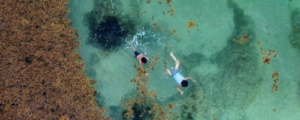© Good Travel Guide, February 2022 by Ken Drew
Do you travel on the weekend and want to reduce your plastic waste? As much as we love and respect Mother Earth, most of us probably don’t want to scrub dishes in a hotel sink to rid ourselves of guilt from using eco-system murdering plastics.
It’s tempting to give in to the care-free nature of using plastics “just this one time” when we travel, you can flick that whispering demon-of-convenience off our shoulder because, I got three uncommon, fun, and fashionable ways to eat and shower without any plastics from the stories of a diverse group of three zero-waste travelers: a young solo backpacker from the UK, a Millennial-aged Trinidad-American couple, and a farmer-market hopping family in California.
Non-Environmental Reasons for Zero-Waste Getaways
If you need additional reasons to persuade others to travel as plastic-free as possible, tell them that plastics are now being discovered in our bodies. Microplastics, according to a new study, were found in stool samples from a handful of volunteers located across Europe and Asia. It makes sense when you consider that 335 million tons of plastic are manufactured globally every year, of which a pathetic nine percent is recycled. That’s over 1.7 million blue whales’ worth of plastic being manufactured annually! When traveling, we can be more likely to use plastic spoons, cups, hotel shampoo bottles, bags, etc.
“More than 95 percent of the particles came from plastics used in food packaging and storage. They included polypropylene used in bottle caps, polyethylene terephthalate (PET) used in drink bottles, polystyrene found in plastic utensils and cups, and polyethylene used in plastic bags and storage containers.”
The author of this study, Dr. Philipp Schwabl, a researcher with the Medical University of Vienna, cautioned “there are no human studies that show how microplastics might affect human health” while his colleague, Dr. Kenneth Spaeth admits that “scientists know plastics contain an array of potentially harmful substances that in other contexts we know can leach out and potentially affect human health.” While it’s easier to use plastics on weekend getaways, there are serious potential health risks when ingesting them. Welcome to the zero-waste movement!
In addition to pressuring companies and governments to adopt environmentally-friendly business practices and legislation, at the consumer level, we can combat climate change, plastic pollution, and plastic-induced adverse health effects by trying our best to be a zero-waste traveler – someone who travels consciously as to try to send nothing to the trash can. This is done by reducing what we need, reusing as much as we can, sending as little as possible to be recycled, and composting everything else.
Here are three travel hacks I challenge you to try out during your next weekend getaway.
PLASTIC-FREE WEEKEND GETAWAY HACK #1: Make or buy beeswax paper
This one is my favorite because it’s versatile, compostable, fashionable, and you can make them at home or buy them.
This hack comes from a mid-30’s interracial couple – Noami and Dustin Grevemberg, who has been traveling the world in their van with one environmental goal in mind. They strive to minimize or eliminate their waste from start to finish.
They blogged about how they recently learned about beeswax paper from a friend and now we use them for everything. They said their favorite thing about them [beeswax paper] is that they stick to themselves which makes them “a great alternative to foil, plastic wrap, and Ziploc bags.”
PLASTIC-FREE WEEKEND GETAWAY HACK # 2: Solid but not difficult – Hard shampoo
It’s said that historical records in India show boiled soapberries and gooseberries were the earliest successful recipes for shampoo as early as the 1700s. Interestingly, shampoo came from the Hindu word – ‘champu’ which means to massage or knead. For hundreds of years, people massaged their hair with boiled berries until a powder form (in a glass bottle) was invented in 1920’s Germany.
Nowadays, it seems like we’ve always had shampoo in a plastic bottle, but one brave company from England is challenging the status quo by bringing hard shampoo back to market – with upscale cookie-shaped bars in carbon negative or recycled-plastic packaging. These bars caught the attention of a world traveler which is where this zero waste travel hack comes from.
Liquid VS Hard Shampoo
The effectiveness of both shampoos varies depending on differences in the type of tap water, your hair’s hygienic needs, and the contents of the soap. Some people have stopped using shampoo and there’s a movement around it called “No Poo”. For those of us who don’t want to risk looking like Bob Marley to eliminate our toiletry plastic footprint, maybe consider using hard shampoo?
Steph Dyson from the United Kingdom is dedicated to plastic-free travel. In his blog – 7 Things I Learned From Travelling Plastic-Free, he used shampoo bars, but eventually went back to the liquid form because it didn’t meet his needs. I think that finding the best hard shampoo can be like finding your true love. It takes trial and error, but when you find it, you better hold on tight! Trying out sustainable toiletries as Steph did during his zero-waste backpacking around the world is crucial because every year in the UK about 520 million empty plastic shampoo and conditioner bottles are thrown out.
Steph probably didn’t do his research. Here’s the science – the best hard shampoo for you depends on the ingredients of the soap, the pH of your shower water, and whether or not the water is soft or hard – meaning the number of minerals in it.
If you feel like teaching yourself about hard shampoo, then how about just going to a zero-waste shop to refill the shampoo bottle you already have? Try searching for your town and your destination for zero-waste grocery stores. Speaking of small businesses…
PLASTIC-FREE WEEKEND GETAWAY HACK # 3: Eat at Bakeries, Mom & Pop Shops, and Farmer Markets (and bring your beeswax paper!)
Seeing the sites while traveling is exciting and so can visiting small zero-waste shops for bamboo alternatives to plastics, a specialty bakery for oven-warm cookies, or a top-rated deli. These ideas came to me from an article in the Los Angeles Times about a 41 and 37-year-old couple with children. These parents in California have demanding jobs and, since watching a documentary on plastic pollution, have been sharing shopping and cooking duties to maintain a plastic-free lifestyle. They purchase meats, loaves of bread, and fruits in paper packaging only. A discount plastic basket of organic berries will have to wait for the next customer. These parents know exactly where to go to fill out their shopping list.
We can learn from pre-planning a few shops, bakeries, or farmer markets to wander around with your loved ones. Try searching for local businesses in Yelp, FourSquare, or pinch-and-zooming Google Maps. you might be amazed at what baked goods, discounts, artisan products, or hand-made hygiene products you might find. When you don’t plan and opt to eat fast food or go to a restaurant, you’re consuming food that comes packaged in plastics which is a big slice of the plastic pollution pie.
Take Australia’s pollution pie for instance. The Guardian reports that the University of Technology Sydney conducted a study where they tracked different kinds of packaging waste in 2017-18. They found only 56% of all packaging waste in the country was recycled during that year which includes papers, cardboard, plastics, and other materials. Of that 56%,only 32% were plastics. Very few plastics are recycled and they aren’t all recycled in the country. A considerable amount of recyclables get exported to other countries for recycling.
Good travelers are guided by mindfulness
We need policy change to stop this crisis. We need legislation. Good people do the do what’s best for others and that empathy is what good travelers like you are guided by.
There are many people like us who are inspiring businesses to go plastic-free. Booking’s research included survey responses from more than 29,000 travelers across 30 countries that found that recycling (49%) and reducing food waste (42%) were top priorities at home.
After reading this article, you now have a foundation of knowledge about how to avoid recycling all together with hard shampoo, beeswax paper, and shopping locally at destinations. We aren’t perfect, but you don’t need to be. You need to try to travel and I hope this guide points you in the right direction on your next weekend getaway.
If you liked this article, visit another one titled Travelling Waste-Free for a downloadable zero-waste guide.




